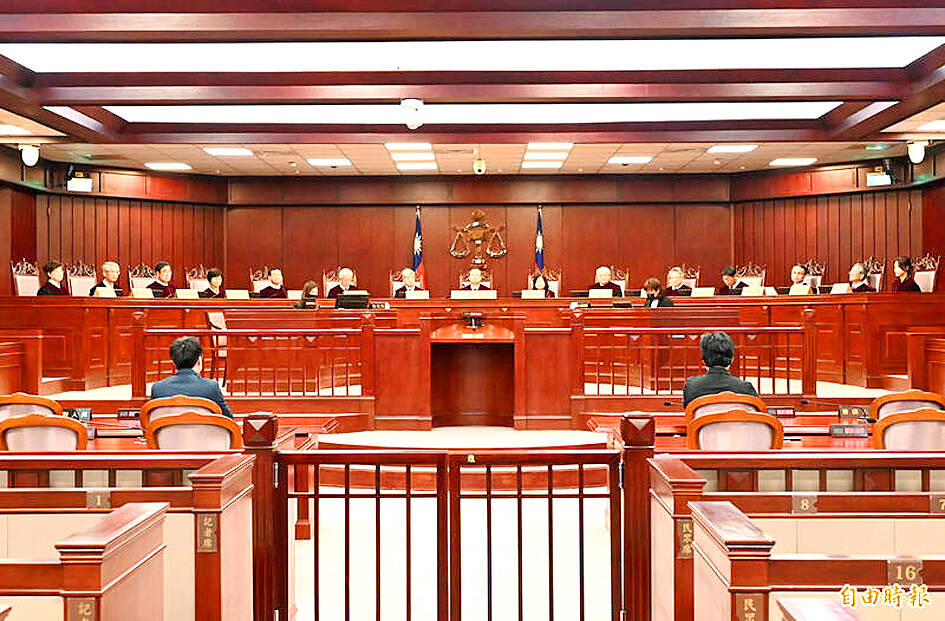The Constitutional Court on Friday ruled unconstitutional the search and seizure of confidential messages shared between lawyers and their clients during a prosecutors’ investigation, and ordered that the law be amended within two years.
The ruling on Articles 122-2 and 133-1 of the Code of Criminal Procedure (刑事訴訟法) came after Lee and Li Attorneys-at-Law challenged the constitutionality of the clauses, when its Hsinchu branch office was raided and messages between staff and clients were seized by prosecutors in a 2011 litigation case.
The law firm said that the prosecutors’ actions had infringed on its right to keep communication with its clients confidential, especially as prosecutors at the time could not prove that the office had committed any wrongdoing to justify their search.

Photo: Taipei Times file
Under the two articles, the premises or properties of any third -party can be searched only if there is probable cause.
A seizure that is not covered by a search warrant must be adjudicated by a judge, except when the item is seized for evidence, the articles say.
The court’s ruling said that the articles fail to take into consideration the attorney-client privilege, which is a rule that protects the confidentiality of communication between lawyers and clients.
The content of the two articles works against Articles 15 and 16 of the Constitution, which stipulate that “the right of existence, the right of work and the right of property shall be guaranteed to the people,” and that “the people shall have the right of presenting petitions, lodging complaints or instituting legal proceedings,” the ruling said.
Agencies should amend the Code of Criminal Procedure within two years, the court said, adding that before the revision of the law is completed, judges and prosecutors should conduct searches and seizures in accordance with the intention of the judgement.
The number of search warrants issued by Taiwanese courts from 2020 to last year averaged nearly 15,000 per year, Constitutional Court head clerk Hsu Chen-chou (許辰舟) said.
During this three-year period, 20 law firms have been searched, of which 18 were due to lawyers having become criminal suspects or because they were involved in collusion to destroy evidence, Hsu said.

Alain Robert, known as the "French Spider-Man," praised Alex Honnold as exceptionally well-prepared after the US climber completed a free solo ascent of Taipei 101 yesterday. Robert said Honnold's ascent of the 508m-tall skyscraper in just more than one-and-a-half hours without using safety ropes or equipment was a remarkable achievement. "This is my life," he said in an interview conducted in French, adding that he liked the feeling of being "on the edge of danger." The 63-year-old Frenchman climbed Taipei 101 using ropes in December 2004, taking about four hours to reach the top. On a one-to-10 scale of difficulty, Robert said Taipei 101

Nipah virus infection is to be officially listed as a category 5 notifiable infectious disease in Taiwan in March, while clinical treatment guidelines are being formulated, the Centers for Disease Control (CDC) said yesterday. With Nipah infections being reported in other countries and considering its relatively high fatality rate, the centers on Jan. 16 announced that it would be listed as a notifiable infectious disease to bolster the nation’s systematic early warning system and increase public awareness, the CDC said. Bangladesh reported four fatal cases last year in separate districts, with three linked to raw date palm sap consumption, CDC Epidemic Intelligence

Taiwanese and US defense groups are collaborating to introduce deployable, semi-autonomous manufacturing systems for drones and components in a boost to the nation’s supply chain resilience. Taiwan’s G-Tech Optroelectronics Corp subsidiary GTOC and the US’ Aerkomm Inc on Friday announced an agreement with fellow US-based Firestorm Lab to adopt the latter’s xCell, a technology featuring 3D printers fitted in 6.1m container units. The systems enable aerial platforms and parts to be produced in high volumes from dispersed nodes capable of rapid redeployment, to minimize the risk of enemy strikes and to meet field requirements, they said. Firestorm chief technology officer Ian Muceus said

MORE FALL: An investigation into one of Xi’s key cronies, part of a broader ‘anti-corruption’ drive, indicates that he might have a deep distrust in the military, an expert said China’s latest military purge underscores systemic risks in its shift from collective leadership to sole rule under Chinese President Xi Jinping (習近平), and could disrupt its chain of command and military capabilities, a national security official said yesterday. If decisionmaking within the Chinese Communist Party has become “irrational” under one-man rule, the Taiwan Strait and the regional situation must be approached with extreme caution, given unforeseen risks, they added. The anonymous official made the remarks as China’s Central Military Commission Vice Chairman Zhang Youxia (張又俠) and Joint Staff Department Chief of Staff Liu Zhenli (劉振立) were reportedly being investigated for suspected “serious